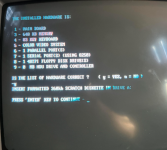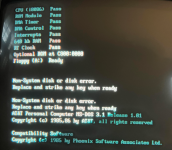coffeecoder104
New Member
- Joined
- Sep 25, 2022
- Messages
- 2
Hey All!
I just purchased an AT&T 6300. I believe it is the original, not the plus. Comes with a 5.25" floppy drive. I am looking to xfer the data that is currently on it to a floppy (or several if need be) and get it to my modern computer. I am also looking to install unix on it for fun and maybe so I can try out some c programming. I had a couple questions:
1. Is there any way in the modern age to transfer data from a 5.25 inch floppy to my PC?
2. What is the latest version of unix that this will run (if any)? Any advice on installing it?
Thanks much!


I just purchased an AT&T 6300. I believe it is the original, not the plus. Comes with a 5.25" floppy drive. I am looking to xfer the data that is currently on it to a floppy (or several if need be) and get it to my modern computer. I am also looking to install unix on it for fun and maybe so I can try out some c programming. I had a couple questions:
1. Is there any way in the modern age to transfer data from a 5.25 inch floppy to my PC?
2. What is the latest version of unix that this will run (if any)? Any advice on installing it?
Thanks much!


